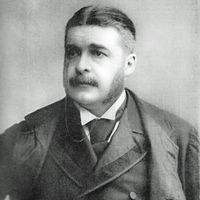Arthur Sullivan (13.05.1842–22.11.1900)
Arthur Sullivan was a British composer, conductor, musicologist and pedagogue. From 1858 to 1861 he studied at the Leipzig Conservatory as a laureate of the Mendelssohn Competition.

1. Biography
Arthur Seymour Sullivan was born as the younger of two sons in the Lambeth district of London on May 13th, 1842. His mother, Maria Clementina, was of Irish-Italian descent; his father, Thomas Sullivan, was Irish. Thomas Sullivan made a living as a clarinettist within the orchestra of the Surrey Theatre and by teaching music privately. In 1845 he became bandmaster at the Royal Military College.
Arthur Sullivan grew up in modest surroundings. At an early age he received a thorough musical education from his father. He started to compose music at only eight years old. At the age of twelve Sullivan became a member of the Chapel Royal in London, which influenced him musically from 1854 to 1856. He proceeded to study at the Royal Academy of Music in 1856. Winning the Mendelssohn Competition gained him a scholarship to study at the Royal Conservatory in Leipzig from 1858 to 1861.
Back in London he worked as an organist at St. Michael’s Church on Chester Square from 1861 onwards. He composed pieces for choir and orchestra. In 1870 he befriended writer William Schwenk Gilbert, with whom he started an active collaboration in the field of opera. From May 1876 and 1881 Sullivan held the position of director of the newly founded National Training School for Music in South Kensington. In 1876 he received an honorary doctorate from the University of Cambridge, followed in 1879 by the University of Oxford. In May 1883 he was knighted by Queen Victoria. From 1881 to 1898 Sullivan was the director of Leeds Music Festival. He offered not only classical works to the audience but also contemporary music. From 1885 to 1888 Sullivan also worked as a conductor for the Philharmonic Society. His partnership with Gilbert, which had suffered quite a lot from business related disagreements, came to an end in April 1890.
2. Private Life
Sullivan never married, but he had rather serious affairs with different women. His longest relationship was to Mary Frances Ronalds, a beautiful American socialite, who was three years older than him. Ronalds hailed from Boston – her exact date of birth is not known. Sullivan met Mary Frances Ronalds on a business trip to Paris in 1867. In 1871 the American singer moved to England. She was also a skilled roller skater and rider. Sullivan dedicated several songs to her, such as The Lost Chord. Sullivan and Ronald kept their relationship a secret, since Ronalds was already married and an extramarital affair was frowned upon by the aristocracy. In his diaries Sullivan noted his meetings and intimate encounters with her mostly only in the form of abbreviations. Sullivan liked to spend a lot of time in France, where he gave dinner parties at his home, which often were attended by famous actors and singers. He also kept a close relationship with his parents, especially his mother. He wrote to her and visited her regularly. Sullivan was also close to his brother Fred. He helped him with his career, and when Fred died at the age of 39, Sullivan became guardian of his nieces and nephews.
3. Connection to Leipzig
Studies at the Conservatory
From October 1858 to 1861, Arthur Sullivan studied as a scholar of the Mendelssohn Foundation at the Conservatory of Leipzig. At this time, he was only 16 years old. In the beginning he had difficulties with the German language. He studied under Ignaz Moscheles, Carl Reinecke and Julius Rietz, whose hospitality he enjoyed from the start. In particular, Ignaz Moscheles, director of the conservatory, gave him a lot of attention. He helped in finding a host family, asked Sullivan to dinner and supported him in his musical career. Sullivan lived with the merchant Döring at Grosse Windmühlenstrasse 15, and after the family moved in 1859, at An der Pleisse 6. His daily class schedule was quite strict with 10 lessons per day. Besides piano and conducting he studied composition under Julius Rietz, who was director of the Gewandhaus Orchestra and the Opera of Leipzig. Among Sullivan’s fellow students were Edvard Grieg and Grieg’s younger brother. Together with his friends he attended concerts in churches, in the Gewandhaus or opera where he came in contact with the works of German composers such as Clara Schumann, Richard Wagner, Franz Liszt and especially Felix Mendelssohn Bartholdy. Sullivan had a great sense of humour, which becomes evident in his later operatic compositions. Research shows that Sullivan attended the liberal synagogue at Gottschedstrasse and sang from time to time in its choir during service. On Easter, 1860 he graduated in piano “with special achievement”. He played the first movement of the Piano Concerto in E flat major by Moscheles. After graduation, Sullivan stayed for one further year in Germany until Easter 1861.
Leipzig Compositions
Most of the compositions from Sullivan’s time in Leipzig were not preserved. In 1859 Sullivan composed two string quartets. One is a romance in G minor, published in 1864, and the other is a sonata movement for string quartet in D minor, dedicated to Mendelssohn. For his Michaelmas exams in 1859 Sullivan wrote the overture for orchestra The Feast of Roses as well as a lost four-part choral composition in English. In 1859 Sullivan wrote the song Ich möchte hinaus es jauchzen for his fellow student Rosamund Barnett, with whom he had a special personal relationship. This piece was thought lost for a long time until Barnett’s nephew rediscovered it in 1947. Another song, composed to a text of Joseph von Eichendorff, is Lied, mit Thränen geschrieben, which today is kept in the Morgan Library & Museum (New York). Furthermore, Sullivan wrote the incidental music for Shakespeare’s The Tempest which premiered on April 11th, 1861 in the Gewandhaus in Leipzig.
4. Reception
In post-war Germany Arthur Sullivan remained unknown as a composer for a long time. It wasn’t until June 2009 that the German Sullivan Society was founded to promote the distribution and understanding of Arthur Sullivan’s complete works, especially in German-speaking areas. His works as a composer in all genres are noteworthy, as well as his accomplishments as a conductor, musicologist and patron. Arthur Sullivan was the most significant British composer of the 19th century. His songs, pieces for orchestra, cantatas and operas as well as his commitment as conductor, festival director and musicologist gave critical new impulses to the British music scene, which had been in crisis since the death of famous Baroque composer Henry Purcell in 1695. By collaborating, Sullivan and writer William Schwenk Gilbert were able to succeed in the shaping of an English national opera. Influenced by his studies in Leipzig, Sullivan used the achievements of composers Carl Maria von Weber, Heinrich Marschner and Albert Lortzing in German opera as a model for his own compositions.
5. Works
Incidental music
- 1861 The Tempest (W. Shakespeare)
- 1888 Macbeth (W. Shakespeare)
- 1895 King Arthur (J.C. Carr)
Stage works
- 1875 Trial by Jury, New York, Morgan Library 1877
- 1877 The Sorcerer, New York, Wolfson Foundation
- 1878 H.M.S. Pinafore, operetta, his first international success
Orchestral works
- 1863 Princess of Wales's March
- 1866 Symphony in E major
- 1866 Overture “In Memoriam”
Audio Samples
Sinfonie in E-Dur (1866) www.youtube.com/watch
Ouvertüre „In Memoriam“ (1866) www.youtube.com/watch
The tempest (1861) www.youtube.com/watch
6. Sources and Links
Burgdörfer, Maximilian: The English Mendelssohn. Sir Arthur Sullivan and Germany, bachelor’s thesis, submitted to the Institute of British Studies, Leipzig University, 2015.
Heidecker, Colin: Britische Komponisten des späten 19. Jahrunderts und ihre Beziehungen zum Leipziger Musikleben – am Beispiel Arthur Sullivans, master’s thesis, submitted to the Institute of Musicology, Leipzig University, 2013.
Saremba, Meinhard: Arthur Sullivan. Ein Komponistenleben im Viktorianischen England, Florian Noetzel, Heinrichshofen-Bücher, Wilhelmshaven 1993.
Links
www.swr.de/swr2/programm/sendungen/zur-person/zur-person-sir-arthur-sullivan-zum-175/-/id=660494/did=19655250/nid=660494/iwua0d/index.html, 1 May 2020, 08:00 a.m.
Photo
upload.wikimedia.org/wikipedia/commons/4/43/Sir_Arthur_Seymour_Sullivan.jpg




